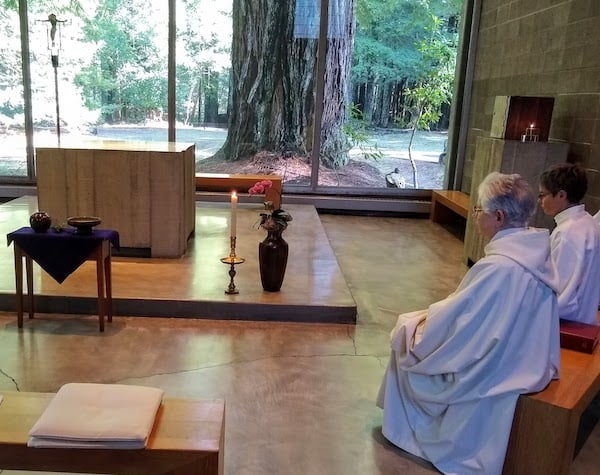Chapter Talk – First Sunday of Lent – February 21, 2021, cycle-B
“At all times the lifestyle of a monk ought to have a Lenten quality” (Benedict’s Rule, A Translation and Commentary, RB 49:1, Terrance Kardong, p.402). Now this sounds heavy, does it not? However, if we reflect more on chapter 49 of the Rule, we will see that Benedict has a healthy and profound theological perspective on Lent.
‘Offering God something of her own free will, with the joy of the Holy Spirit, beyond the normal Lenten communal practice’ (RB 49:6). Fr. Terrance Kardong, in his commentary on this passage from the Rule, says that “…the natural tendency is to associate penance with sorrow” (p.405). He challenges this assumption and adds, “All of monastic life depends on a willing and spontaneous spirit of joyful love….What is necessary is to purify one’s motives so that the Spirit can work freely in one’s heart” (p.405). Can we not say from this that the character of Lent is to watch over the heart to be sure that it is pure enough in its intentions for the Spirit to work freely, unencumbered by the personal baggage we each have that can block the Spirit’s work. Benedict’s intention to the community in his Lenten exhortation is “to improve the quality of its spiritual life” (p.408). Kardong emphasizes that St. Benedict refuses to reserve “joy for the Easter season, while Lent is supposedly a time for sorrow…For the joy that Benedict calls for during Lent does not depend on our moods, but upon a much more solid foundation, namely, the Holy Spirit” (p.409). If we only focus on this for Lent, clearing away the obstacles interiorly in order to build a solid foundation for the Spirit to do its work, would not this daily practice offer an important renewal for us individually and for our community? And indeed, prepare us for the ‘joy of Easter’.
Turning to Pope Francis, he uses a unique phrase that struck me as a profound insight into the human person. The obstacle to spiritual and psychological growth he names “isolated conscience” (Let Us Dream, p.69). An isolated conscience, Pope Francis says, “acts as a major obstacle to the union of hearts and minds” (Let Us Dream, p.69). An isolated conscience begins within an individual, and if not recognized and faced, it spreads, first interiorly and then in our lived lives. It can tear down a community and the larger body of the Church. As followers of Jesus, as we grow into his way of seeing, loving and being, it is important that we recognize this dynamic and throw the negative power it can exert over us ‘upon the rock of Christ’. Just listen to what Pope Francis says further: “No matter which realm we’re examining, it’s important to understand the effect of a bad-spirit temptation to withdraw spiritually from the body to which I belong, closing us in on our own interests and viewpoints by means of suspicion and supposition. And how this temptation turns us, ultimately, into beleaguered, complaining selves who disdain others, believing that we alone know the truth” (p.69). An ‘isolated conscience’, this ‘bad spirit’ tempts us to withdraw from the body of community because morally we say to ourselves, ‘I am right’. We are so tightfisted in hanging on to our viewpoint that its impact is to withdraw, separate ourselves and remain within these very narrow confines, which has nothing to do about God but more about us, asserting a self that has not examined its motives, and has not listened humbly and truthfully as we are exhorted in the Rule. When caught in this unhealthy dynamic, there is a refusal to ‘let go’, to pray for light, for an open heart and spirit. Rather, we continue to point the finger at whomever or whatever because we are on our high horse of moral self-righteousness. We have enough examples in the gospels of Jesus being ‘tested’ by the upholders of the law who are plagued by an ‘isolated conscience’, those who say, ‘they see but do not see, who hear but do not hear’.
Let me quote two more selections from Pope Francis: “To the self, beleaguered by the isolated conscience there is never a shortage of reasons for staying on the balcony while real life passes below” (p.71). Self-righteousness separates, it does not unite. With an isolated conscience we separate ourselves from the body of community and the larger body of the Church. We stay apart, complain and criticize, murmur incessantly, which builds obstacles to a ‘union of hearts and minds’. Finally, these words: “Jesus did not found the Church as a citadel of purity nor as a constant parade of heroes and saints—although thank God we do not lack these. It is something much more dynamic: a school of conversion, a place of spiritual combat and discernment, where grace abounds along with sin and temptation” (p.72). To be a schola caritatis, a school of love, as St. Bernard likes to name the ‘monastic school of the Lord’s service’, is to be a school of conversion. With each new turning from a bad spirit attitude to a new heart attitude is not a heavy process…it is a process that brings life, hope, light, freedom. When the heart changes, the result is lightness of spirit, freedom to be and to serve.
“The Word of God is something alive and active…it can judge the secret emotions and thoughts” (Heb 4:12). The Word of God, Jesus’ words can help us see this isolated self-righteous manner and bring us into the fullness of grace and truth, if we descend into the ground of humility, which is the ground of truth and the place where we will encounter the Word of life, the healing Word, the Word that open us up to the larger horizon of God’s heart and love.
Sr. Kathy DeVico, Abbess


